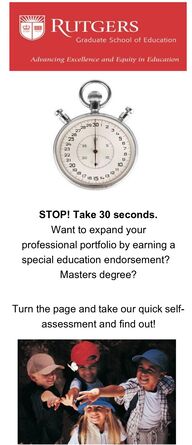
Return to flip book view
STOP! Take 30 seconds. Want to expand your professional portfolio by earning a special education endorsement? Masters degree? Turn the page and take our quick self- assessment and find out!
Have you been thinking about any of the following questions? Note any item where the answer is YES. Do you work with students with special needs where you sometimes feel a need for additional knowledge and skills? Are you already finding yourself in teaching situations where in essence, you are at least some of the time engaging in the role of a special educator? Would you like to feel more confident impacting learning outcomes, when working with students with special needs? Have you ever had that wonderful experience, working with a student with special needs, where things finally CLICK and it's a breakthrough moment? Have you considered seeking additional training for career advancement? If you noted 3 or more items, then you should definitely find out more about our Masters and non-degree endorsement programs in Special Education and applying to the Rutgers Graduate School of Education. We are especially interested in receiving applications from historically underrepresented groups. For more information: https://gse.rutgers.edu/program/special-education/ Program questions? Email judith.harrison@gse.rutgers.edu
OVERVIEW Application Deadline: Feb 1 / Oct 15 / May 15 (Late applications will also be considered as they arrive) Learning Disabilities Teacher Consultant (LDTC) This 36-credit Ed.M. program offered by the GSE prepares practicing teachers to serve as Learning Disabilities Teacher-Consultants (LDT-Cs) in public school systems. LDT-Cs work as assessment specialists and members of the pupil personnel services team. The 24-credit non-degree LDTC endorsement (which can later be upgraded to a Masters) also enables teachers to meet New Jersey requirements for LDTC licensure. Teacher of Students with Disabilities (TOSD) (Also available as a Masters with a GSE Gifted Education Certificate) The 36-credit Ed.M. in Special Education with Teacher of Students with Disabilities Certification program prepares certified educators to become teachers of students with disabilities within an elementary or secondary school setting. The 21- credit non-degree LDTC endorsement (which can later be upgraded to a Masters) also enables teachers to meet New Jersey requirements for TOSD licensure. Applied Behavior Analysis (ABA) The 36-credit Ed.M. in Special Education with ABA Sequence program, offered jointly by the Rutgers Graduate School of Education and the Graduate School of Applied and Professional Psychology, provides advanced graduate preparation in special education while enabling students to take 6 out of 7 courses required to sit for the Board Certified Behavior Analyst (BCBA) exam.
Faculty Profiles Dr. Judith Harrison, coordinator for the Special Education program, has over 20 years of experience as a counselor and special educator, where she has primarily worked with children with ADHD and Behavioral Disorders. Dr. Harrison’s most recent research looks closely at comparing the effectiveness of interventions and accommodations for children with behavioral disabilities. Dr. Dake Zhang specializes in mathematics learning disabilities. She has developed and validated accommodation techniques and intervention strategies for students with math learning difficulties. Dr. Matthew J. Mayer is a former special education teacher. He specializes in school violence prevention, bullying prevention, cognitive-behavioral interventions, and methodological issues in school violence and related research. Leslie Calabrese, coordinator for the dual 5-year program, is an Instructor of Professional Practice, and supports GSE pre-service teachers as Partnership Leader in the GSE Community School Partnership Network. As a Board Certified Behavior Analyst and a former public school teacher, she specializes in evidence- based practices that enhance the learning experience for P-12 students.
FAQs 1. Q: Can I start the non-degree version of TOSD or LDTC and later change over to also earn the Masters? A: YES, but there can be some restrictions with the LDTC because of the differences in the statistics and measurement courses. You need to consult with program faculty early if thinking about making this change. 2. Q: Are any of the non-degree programs 100% online? A: YES. The TOSD non-degree can be taken 100% online. Many of the LDTC classes are available online, but the practicum and 1-2 other required LDTC courses are usually offered as face-to-face. 3. Q: Why should I earn the TOSD endorsement? A: Teachers often find themselves working with students with disabilities where they recognize a need for greater expertise. 4. Q: Why should I earn the LDTC endorsement? A: Teachers who want to become more involved with Child Study Team and I&RS Committees, as well as opening the door to professional advancement often take this path. 5. Q: Why take the ABA Masters program? A: Behavioral specialists are in increasing demand and this opens new doors of professional opportunity. 6. Q: Will I earn the BCBA from this ABA Masters program? A: Not directly. Completion of this program and the suggested coursework fulfills your behavior-analytic coursework. Additionally, you must complete 2000 hours of supervised fieldwork and pass the BCBA exam to become a BCBA.
THE FUTURE Graduates of this program will be highly knowledgeable and skilled teacher- scholars, in great demand, ready to take on challenges and make a difference in the lives of at-risk children and adolescents. WHY? Advanced training Real world experiences Evidence-based knowledge & skills Understanding complex challenges Expertise in prevention Interdisciplinary knowledge & skills Expertise in teaching Strong mentorship Expert faculty